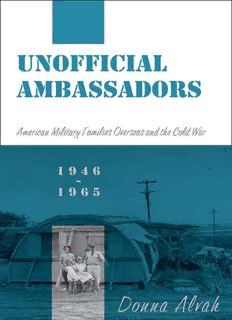
Unofficial Ambassadors: American Military Families Overseas and the Cold War, 1946-1965 PDF
Preview Unofficial Ambassadors: American Military Families Overseas and the Cold War, 1946-1965
Unofficial Ambassadors Unofficial Ambassadors American Military Families Overseas and the Cold War, 1946–1965 Donna Alvah a NEW YORK UNIVERSITY PRESS New York and London new york university press New York and London www.nyupress.org © 2007by New York University All rights reserved Library of Congress Cataloging-in-Publication Data Alvah, Donna. Unofficial ambassadors : American military families overseas and the Cold War, 1946–1965/ Donna Alvah. p. cm. Includes bibliographical references and index. ISBN-13: 978-0-8147-0501-8(cloth : alk. paper) ISBN-10: 0-8147-0501-4(cloth : alk. paper) 1. Families of military personnel—United States. 2. Military spouses—United States. 3. Americans—Foreign countries—History— 20th century. 4. United States—Armed Forces—Foreign countries— History—20th century. 5. Cold War. I. Title. UB403.A4692007 355.1'29—dc22 2006032854 New York University Press books are printed on acid-free paper, and their binding materials are chosen for strength and durability. Manufactured in the United States of America 10 9 8 7 6 5 4 3 2 1 For my mother and father, and for Elun Contents Acknowledgments ix Introduction 1 1 Going Overseas 14 2 Unofficial Ambassadors 38 3 A U.S. Lady’s World 81 4 “Shoulder to Shoulder” with West Germans 131 5 “Dear Little Okinawa” 167 6 Young Ambassadors 198 Conclusion 226 Notes 235 Bibliography 261 Index 273 About the Author 291 vii Acknowledgments I first discussed the idea for this study with Professor Roland Marchand many years ago. From the start, Roland liked the prospect of a project that analyzed the contributions of women and families to foreign relations. He served as my dissertation supervisor until he passed away in November 1997. I remain grateful for his encouragement and advice. I must thank many other people who, in reading all or parts of the manuscript at different stages of its creation, have offered scholarly scru- tiny, practical advice, reassurance, generosity of time and energy, and a good sense of humor. I have benefited from Andy Rotter’s thinking on gender and Cold War foreign relations, and also on writing and chapter organization, and last but not least from his and Padma Kaimal’s kindness and friendship. From my first meeting with Karen Halttunen in 1993, I admired her insight and sharp thinking, and knew that working with her would be a privilege. Her contributions as a dissertation supervisor— straightforward critiques of the strengths and weaknesses of all the chap- ters at various stages, from the first to the last drafts; readings of confer- ence papers; discussions of my concerns; keeping me on track to meet deadlines; suggestions for consulting with other professors outside her own field of expertise; and steady encouragement—were exactly what I needed to get through. I also appreciate Jay Mechling’s suggestions on children and American culture; Cynthia Enloe’s feedback on women, gen- der, race, class, the military, and international relations; Judith DeGroat’s thoughtful suggestions on a later version of the manuscript; and Steve Rabson’s close reading of and advice for parts of the manuscript. The comments of two anonymous readers were quite helpful. At conferences, several scholars assisted my thinking on this project, including Robert Dean, Catherine Forslund, Petra Goedde, Walter Hix- son, Maria Höhn, Christina Klein, Andy Rotter, Alex Epstein, and Molly Wood. The Cross-Cultural Women’s History group in the University of California Davis Department of History, the Committee on Lesbian and Gay History, and the Cold War History Group at the University of Cali- fornia at Santa Barbara sponsored presentations of my research. I thank ix
Description: